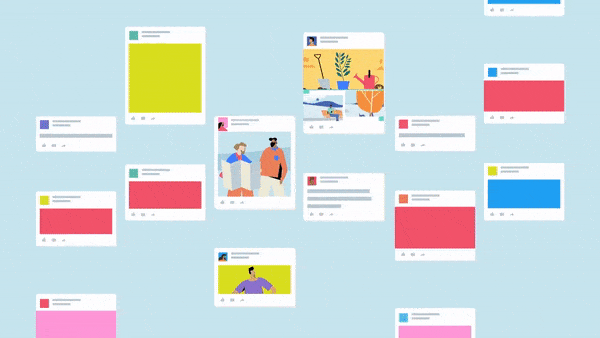Facebook has announced more News Feed algorithm changes that will prioritize posts from friends and family over brands. These updates, rolling out over the next few months, attempt to solve growing trust issues, mental health concerns and user complaints regarding the platform.
Last year, the social network announced that it would rank posts from personal connections over those by publishers or businesses, forcing marketers to re-think their engagement strategies. This latest update will rank personal connection posts by interactions—so it’s not enough for Mom to share your brand’s latest video.
According to a blog post on Thursday, Facebook will continue to rank personal posts and show even less “public” posts from brands. Facebook warns that brand pages may see their reach, watch time and referral traffic decrease, especially for posts without a lot of comments and likes.
For marketers, creating content worth sharing and building an audience may help Facebook News Feed ranking efforts. Influencer marketing may help as well due to higher engagement, although official pages, in general, will be ranked lower on the News Feed. Facebook encourages the use of Facebook Live video, citing six times as many interactions as regular videos.
The platform already prioritizes content based on how much users engage with a post, which can be exploited using what Facebook calls “engagement bait.” Beginning in December, the company began demoting posts that elicit a response such as “Like if you love puppies” or “tag a friend for a chance to win.”
“Recently we’ve gotten feedback from our community that public content—posts from businesses, brands and media—is crowding out the personal moments that lead us to connect more with each other,” Facebook CEO Mark Zuckerberg posted on Thursday.
Zuckerberg likely refers to posts like this one about how important messages such as a friend’s death are often buried by Facebook’s algorithms. He may also be eluding to the site’s ongoing battle with fake news that may have swayed the 2016 US Presidential Election. Representatives from Facebook, Twitter and YouTube have been called to a Congressional hearing next week to explain how they will combat the spread of extremist propaganda.
A number of studies have shown that frequent Facebook use can increase depression and social comparison. Zuckerberg didn’t acknowledge any particular studies in his update, but cites passive activities on Facebook as “not so good” for a user’s wellbeing. That, he claimed, is why the company’s goal is to help Facebook users have more meaningful interactions.
In the long term, happier Facebook users could mean more time spent on the platform and more chances to create meaningful interactions with brands. An October Verge survey found that Facebook had the lowest percentage of people who liked its products and services compared to Amazon, Google, Apple or Microsoft.
In the short term, this update means marketers may find less organic interaction with the Facebook News Feed and turn to ads or other social networks to reach audiences. EMarketer expects Facebook to dominate US social network ad spend, generating $21.57 billion in US ad revenues this year, accounting for almost 83 percent of total social media ad spending in the country.
https://www.facebook.com/facebook/videos/10156988765141729/

